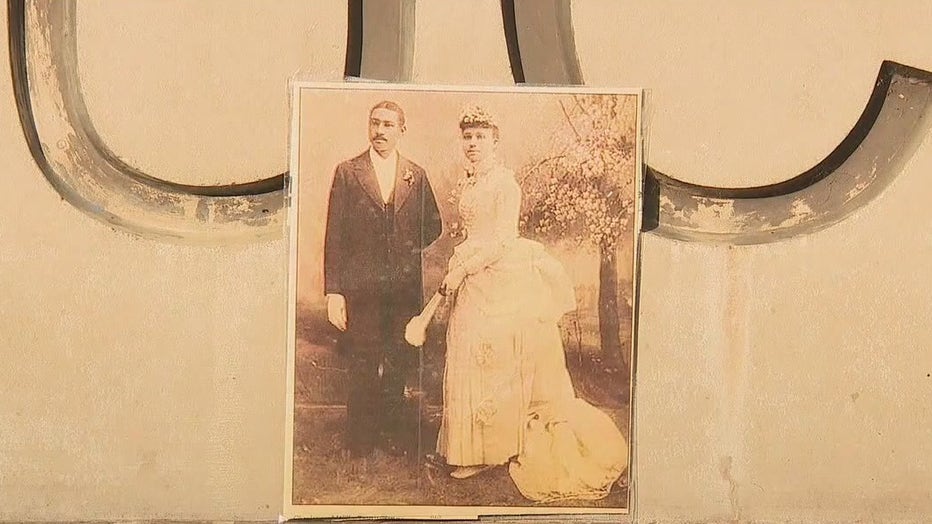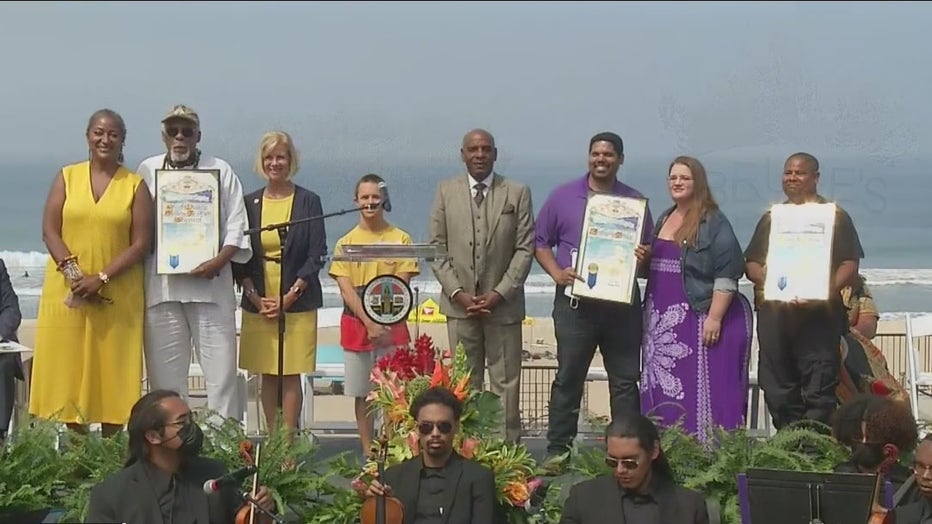Bruce's Beach returned to heirs of Black couple
MANHATTAN BEACH, CALIF. - In a celebratory event overlooking the ocean, Los Angeles County officials Wednesday formally presented the deed to a pristine piece of Manhattan Beach property to the descendants of a Black family who had the land stripped away nearly a century ago.
Supervisor Janice Hahn, who spearheaded the effort to return Bruce's Beach to the family, and Supervisor Holly Mitchell, whose district now includes the property, oversaw the ceremonial event giving ownership of the land to the Bruce family.
"I always tell people that I'm embarrassed to say I didn't know the story of Bruce's Beach for most of my life," Hahn said. "... I learned to swim in the ocean a few blocks from here, but I didn't learn about what had happened to Willa and Charles Bruce until 2020 when I heard about a protest taking place at the park up the street."
That protest prompted Hahn to research the history of Bruce's Beach, and she learned that the property was now owned by the county. She then began a complex effort to return the land to the Bruce family.

Charles and Willa Bruce purchased the land in 1912 and operated a resort for Black residents until the city of Manhattan Beach condemned the property under a false pretense of developing a park. Instead, the property sat vacant for years after the Bruces and other Black families were evicted from the area.
Anthony Bruce, a great-great-grandson of Willa and Charles Bruce, was among the family members on hand for Wednesday's ceremony held near the property at Highland Avenue and 26th Street. He read off a long list of people who have supported and publicized the effort to have the land returned to the family.

He concluded, "Without God, we would not be here today. And finally, thank you all. God bless."
Activist Kavon Ward, who led protests for years pushing for justice for the Bruce family, said the spirits of Willa and Charles Bruce were present for Wednesday's event.
"Can we just take a moment to feel the energy of the ancestors present here today?" she said. "The ancestors are here. Feel it. Appreciate it."
Bruce family spokesman Chief Duane Yellowfeather Shepard added, "They're here. They're here. And they're smiling."
Under an agreement approved by the Board of Supervisors in late June, the land is officially being transferred to Marcus and Derrick Bruce, great- grandsons of Charles and Willa Bruce. The Bruces will lease the land back to the county for $413,000 a year for the continued operation of county lifeguard facilities at the site.
The agreement also includes clauses that would allow the Bruces to later sell the property to the county for a price not to exceed $20 million.
Returning the property required a change in state law to authorize the county to transfer ownership of the land. It also required various actions at the county level to identify Bruce family heirs and settle the various financial implications of transferring the property.
PREVIOUS COVERAGE: Update on future of Bruce's Beach
Following an array of legislative approvals stretching from Los Angeles to Sacramento, the county Board of Supervisors Tuesday is expected to formally approve the transfer of a pristine piece of Manhattan Beach seaside property to the descendants of a Black family who had the land stripped away nearly a century ago.
"We can't change the past and we will never be able to make up for the injustice that was done to Willa and Charles Bruce a century ago, but this is a start," Hahn said during the board meeting in June.
Hahn said the move will allow the Bruces' descendants a chance "to start rebuilding the generational wealth that was denied to them."
Willa and Charles Bruce purchased their land in 1912 for $1,225. They eventually added some other parcels and created a beach resort catering to Black residents, who had few options at the time for enjoying the California coast.
Complete with a bath house, dance hall and cafe, the resort attracted other Black families who purchased adjacent land and created what they hoped would be an oceanfront retreat.
But the resort quickly became a target of the area's white populace, leading to acts of vandalism, attacks on vehicles of Black visitors and even a 1920 attack by the Ku Klux Klan.
The Bruces were undeterred and continued operating their small enclave, but under increasing pressure, the city moved to condemn their property and surrounding parcels in 1924, seizing it through eminent domain under the pretense of planning to build a city park.
The resort was forced out of business, and the Bruces and other Black families ultimately lost their land in 1929.
The families sued, claiming they were the victims of a racially motivated removal campaign. The Bruces were eventually awarded some damages, as were other displaced families. But the Bruces were unable to reopen their resort anywhere else in town.
Despite the city claiming the land was needed for a park, the property sat vacant for decades. It was not until 1960 that a park was built on a portion of the seized land, with city officials fearing the evicted families could take new legal action if the property wasn't used for the purpose for which it was seized.
The exact parcel of land the Bruces owned was transferred to the state, and then to the county in 1995.
The city park that now sits on a portion of the land seized by the city has borne a variety of names over the years. But it was not until 2006 that the city agreed to rename the park "Bruce's Beach" in honor of the evicted family, a move derided by critics as a hollow gesture.

